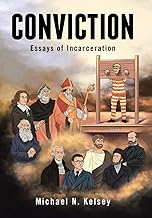
Review by Kevin T McEneaney
How do innocent people who are wrongfully sentenced to prison adjust to their confinement? Intelligent intellectuals, from Socrates to Boethius and Solzhenitsyn, have a long history of unjust incarceration. Here, we have the local memoir of an innocent man (just released from prison) who recounts the fate of notable cases and his own. His perspective is rooted in moral philosophy.
The book’s title has a double meaning: the author’s legal conviction and his determination to stand fast for his conviction of innocence. He refused the four plea deals offered to him that would exempt him from serving time in prison, which led to a seven-year prison sentence.
The narrative is brilliantly articulate and eloquent about the history of famous thinkers who have endured similar adversity. The author’s situation is addressed with remarkable pathos and truth. The author’s circumstances are remarkably parallel to those of the sixth-century philosopher Boethius (whom he taught at a local college), who was wrongfully incarcerated for many years due to nefarious political intrigue.
Assisted by the writings of Adam Smith and Alexander Solzhenitsyn, Kelsey delves into the psychological torment that links mental instability to correctional facilities, shedding light on this nexus with anecdotes from his family and the psychological institutional degradation of inmates. He exposes the aloofness, blindness, and occasional corruption of the legal system. The book remains intensely rational while evoking deep emotional honesty with a knowledgeable historical panorama. Solzhenitsyn declares an arrest “is an unassimilable earthquake not every person can cope with…as a result of which many people often slip into insanity.”
About his case, Kelsey says: “While shame can infect the innocent, it is the anger at being falsely accused that commonly distinguishes the falsely accused from the guilty. A falsely accused man gets angry and fights back and resists, as I did in not resigning my legislative seat. I did not take a reduced plea. I ran for re-election even without the support of my party. As one constituent from Millbrook commented ‘He’s not acting like a guilty man.’ Quite simply I was not ashamed because I was not guilty.”
Kelsy discusses how public shaming harms the guilty and the innocent alike imposes a false reality on one’s life and delivers a trifold effect. One’s freedom to decide is obliterated by the public nature of the charge. Secondly, the label of the charge overtakes the right of self-determination. Thirdly, the outcry of public condemnation in newspapers and online secures public disapproval and destroys one’s dignity. Throughout history “justice” is often “commandeered by the power politics of justice.”
What makes the personal story of this book so timely is that what happened to Michael Kelsey bears startling similarities to what has happened to our nation at large: his personal story becomes a contemporary allegory for the whole nation as truth will be officially declared to be fiction.
Ultimately, this book is about love and truth, two ideals that will be publicly degraded by those who prefer to wield power over the helpless to impose grandiose narcissism on the public. This book provides an excellent and profound psychological analysis on the predicament of our contemporary reality.